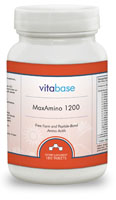| |
Alanine |
|
Alanine is a nonessential amino acid, it is one of the 20 most common natural amino acids. Alanine is not essential to the human diet, since it can be synthesized from other cellular metabolites. Alanine is manufactured from other amino acids in the liver. Its side chain is a nonpolar, hydrophobic methyl group, and is the second-smallest of the 20 after glycine. The low reactivity of the amino acid permits silk, a protein which contains some 30% alanine, to have a simple, elongated structure with few cross-links. Alanine is one of the simplest of the amino acids and is involved in the energy-producing breakdown of glucose. L-alanine is created in muscle cells from glutamate in a process called transamination. Alanine comes from the breakdown of DNA or the dipeptides, anserine and carnosine, and the conversion of pyruvate, a compound in carbohydrate metabolism. In the liver, alanine is transformed into pyruvate. Alanine was first isolated in 1879. |
| |
Alanine functions, uses, and health benefits |
|
| Alanine is used by the body to build proteins. Alanine is vital for the production of protein, essential for proper function of the central
nervous system and helps form neurotransmitters. Alanine is necessary for the promotion of proper blood glucose levels from dietary protein. Alanine is abundant in human muscle tissue. Alanine is readily converted to glucose when blood sugar levels fall and amino acids are liberated from muscle tissue to provide energy. During exercise the muscles release alanine into the bloodstream in direct proportion to the intensity of the exertion. The alanine is then is converted into glucose and released into the blood plasma. Alanine may help keep blood sugar levels stable during exercise. Glucose can be made from alanine in the liver or muscles when energy is needed, and thus it may help maintain the blood sugar level. Low levels of blood sugar have been linked with fatigue during exertion, some experts believe alanine supplements might enable athletes to exercise for longer periods of time at competitive intensities. Alanine stimulates lymphocyte production and may help people who have immune suppression. Alanine strengthens the immune system by producing antibodies. This amino acid is known to be involved in the metabolism of the vitamin pyridoxine, and also tryptophan. Alanine is present in prostate fluid, and it may play a role in supporting prostate health. Alanine is one of the most widely used in protein construction. Only the l-alanine participates in the biosynthesis of proteins. This contributes to the desirable features of the fiber-strength, resistance to stretching, and flexibility. |
| |
Dietary sources of alanine |
|
Alanine is a nonessential amino acid, which means that it is manufactured from other amino acids in the liver, it does not have to be obtained directly through the diet. Alanine is found in a wide variety of foods, but is particularly concentrated in meats. Alanine is manufactured in the body from pyruvate. Alanine can also be manufactured from branched chain amino acids such as valine, leucine, and isoleucine. Good sources of alanine include beans, meat, nuts, seafood, seeds, soy, whey, brewer's yeast, brown rice bran, caseinate, corn, dairy products, eggs, fish, gelatin, lactalbumin, legumes, whole grains.
|
| |
Alanine dosage, intake |
|
Alanine is abundant in protein foods and can be synthesised in the body. Most people do not need to supplement with alanine. In case alanine supplementation is necessary for some patients, appropriate dosage should be determined with the consultation of a qualified physician. |
| |
Alanine deficiency |
|
Because the body easily constructs alanine from other sources, it is difficult to become deficient in alanine. Deficiencies of a nonessential amino acid will not occur if a well-balanced diet is consume because the intake of proper foods will allow the body to produce exactly the amount of amino acid required to function optimally. Vitamin B6 deficiency will cause an alanine deficiency. Alanine deficiency has been seen in hypoglycemia, and alanine supplementation may be helpful in treating this condition. |
| |
Toxicity, side effects, interactions, and contraindications |
|
Alanine is generally considered to be safe for most people. However, people with kidney or liver disease should not consume high intakes of amino acids without consulting a healthcare professional. Isolated alanine supplements are not recommended. No known interactions with nutrients, herbs, foods, or laboratory tests. |
|
|
|
|
